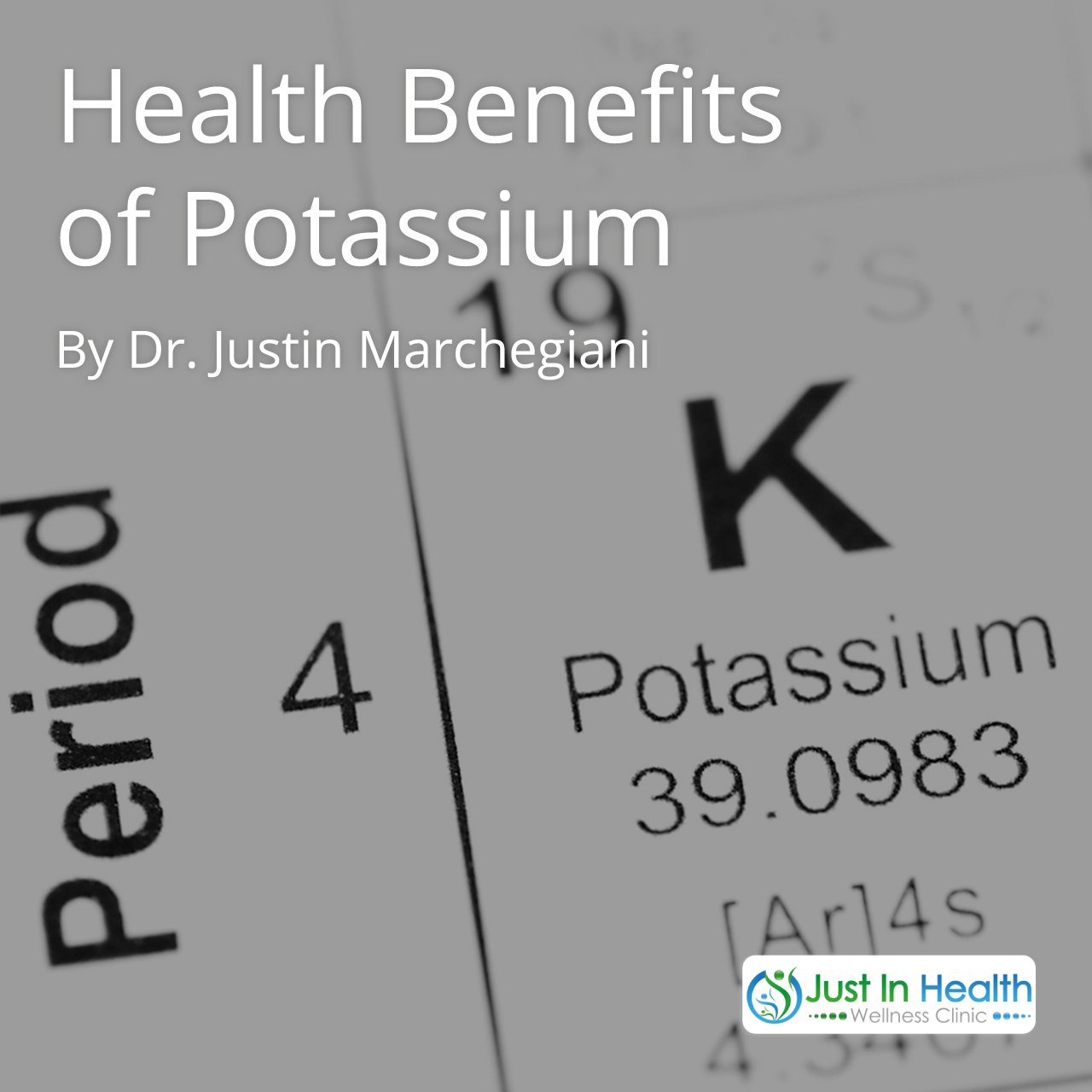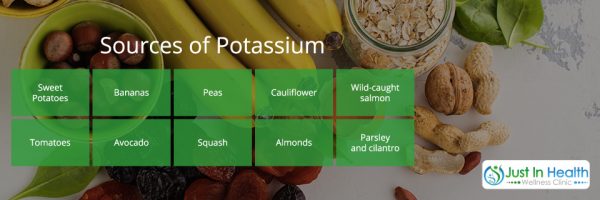

By: Dr. Justin Marchegiani
Over the years we can see a major change in our food habits. While our ancestors were mainly dependent upon fresh fruits and vegetables, but in recent days most of us get inclined to choose ready-to-cook food items or easy to make food items to balance either fast or a sedentary lifestyle. This change of food habits may be a prime reason for inviting several non-communicable diseases like hypertension, cardiovascular disease, arthritis, osteoporosis, repetitive kidney stone formation etc. Fresh fruits, vegetables, and nuts are very good sources of Potassium.
Potassium is a well-known mineral that plays several vital roles in our body. Primarily, maintaining the fluid and electrolyte balance, maintaining the pH of the body fluids (the acidity or alkalinity of the body fluids depends upon pH), assisting in nerve signaling transportation to muscle tissues and uphold normal functioning. According to the World Health Organization (WHO) recommendations, the adults should take at least 90 mmol (3510 mg) potassium every day. [1] However, recommendation for daily intake of potassium may vary country-wise; as in the United States, Canada, Bulgaria, and Republic of Korea recommends 120 mmol of potassium every day. [2] Hence, it is imperative to have a detailed knowledge about the role of potassium in our body.
The normal limit of potassium is 3.6 to 5.2 mmol per liter of blood. An immediate medical attention may be required if you have lower than 2.5 mmol of potassium per liter of blood. Hypokalemia is the medical term to indicate a low level of potassium in the body.

The following are some symptoms associated with low potassium level:
If you frequently face any of the above symptoms then it is always advisable to go for a health checkup.

Apart from the above conditions which may be controlled by maintaining a proper potassium level in the body, it also imparts various health benefits which can inspire you to maintain a healthy potassium level.
Hypertension is a common health problem; almost one-third of Americans have hypertension. Hypertension usually does not provide any symptoms, but it is one of the major cause of stroke and cardiovascular diseases and kidney problems. Sufficient potassium intake can effectively control hypertension. An intake of less amount of potassium-containing diet can result in excretion of less amount of potassium through urine. This indicates electrolyte imbalance (imbalance of sodium-potassium ratio in the blood), which causes hypertension. An adequate amount of potassium intake can maintain electrolyte balance and influence receptors, hormones and nervous system to dilate or expand blood vessels. Dilation of blood vessels reduces the extra pressure exerted by the blood in the wall and control hypertension.
Research study provides the evidence that if you have potassium deficiency due to inadequate poor potassium diet, then your urine will definitely contain less amount of potassium. This will lead to over functioning of the heart and can cause a stroke because of increase blood pressure lowering effect. The potassium-rich fresh fruits and vegetables are also an adequate source of antioxidant. These antioxidants prevent cardiovascular diseases by scavenging or removing free radicals.
Osteoporosis is another most common condition, especially in women population. It is a disease which occurs when the bones in our body become weak and may break very easily (maybe from a fall or, maybe even due to sneezing in case of serious disease condition). The potassium therapy is a cost-effective treatment to improve your bone health and prevent osteoporosis. Potassium-containing diet is alkaline in nature and assists to maintain the pH of the blood and prevents bone tissue damage.
Calcium, the most important bone content can also be restored by consuming potassium-rich diet because potassium can decrease the calcium excretion through urine. A research study showed that 90mmol/day of potassium can able to decrease the parathyroid hormone activity and thus it prevents calcium loss from the bones.
Pain due to kidney stones is unbearable; often causes problems during urination, like burning sensation, bladder discomfort and also induces or creates urinary tract infections. Potassium-containing diet is a simple remedy to the individual who suffers from repetitive kidney stone formation problems. Potassium reduces absorption of calcium in the gut wall. Potassium can do this, as it reduces phosphate retention by the kidneys. Human studies conducted in the U.S.A. showed that a potassium-rich diet can able to reduce the repeated incidence of kidney stone formation in both men and women.
Diabetes is a metabolic disorder. American Diabetes Association revealed that almost 15.7 million Americans are suffering from diabetes. Several human research reports stated that lower potassium level aggravates the diabetic complications by increasing BMI, and increasing waist size, while the fasting insulin level also gets increased. [6]

There are several easily available potassium-rich food sources are present in nature, which can easily increase the potassium level to combat potassium deficiency. If you opt for a suitable dietary measure, then it will be very economical and can save money to buy different potassium supplements.
Most interestingly, a calorie-rich diet contains more potassium. The below table mentions rank wise different dietary sources of potassium and their calorie value:
| Dietary source or name of the Food | Serving size (gm) | Quantity of Potassium (mg) | Present Energy (kcal) |
| Baked potato with flesh and skin | A small sized potato (143) | 738 | 128 |
| Canned Prune Juice | One cup (256) | 707 | 182 |
| Canned Carrot Juice | One cup (236) | 689 | 94 |
| Tomato (paste) | Quarter cup (65.5) | 664 | 54 |
| Cooked Green Beans | Half cup (74.5) | 654 | 19 |
| Canned White Beans | Half cup (90) | 595 | 149 |
| Canned Tomato Juice | One Cup (243) | 556 | 41 |
| No fat and low fat containing Plain Yogurt | Eight ounces (245) | 531-579 | 127-132 |
| Tomato Puree | Half Cup (125) | 549 | 48 |
| Skinned Baked Sweet Potato | One medium size (119) | 542 | 103 |
| Fresh Orange Juice | One Cup (248) | 496 | 112 |
| Cooked yellowfin, Tuna | Three ounces (57) | 484 | 118 |
| Banana | One medium size (118) | 422 | 105 |
| Skimmed Milk | One Cup (245) | 382 | 83 |
| Boiled parsnip | Half Cup (80.5) | 296 | 55 |
| Boiled Green Peas | Half Cup (82.5) | 217 | 37 |
| Boiled sweet yellow colored Corn | Half Cup (79) | 162 | 72 |
| Boiled Cauliflower | Half Cup (70) | 89 | 14 |
https://www.ncbi.nlm.nih.gov/pmc/articles/PMC3650509/
References